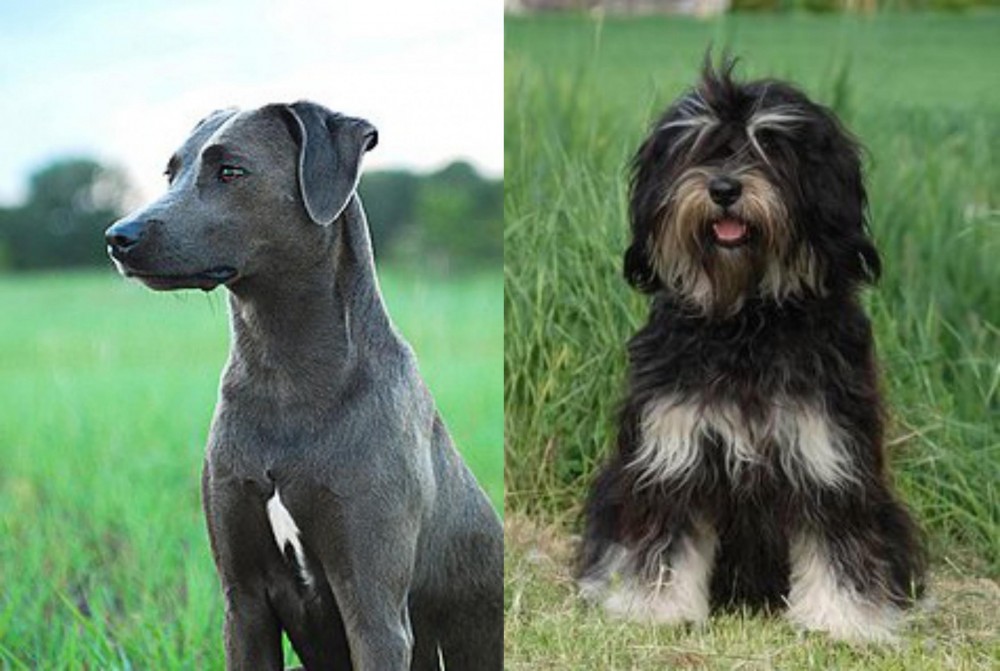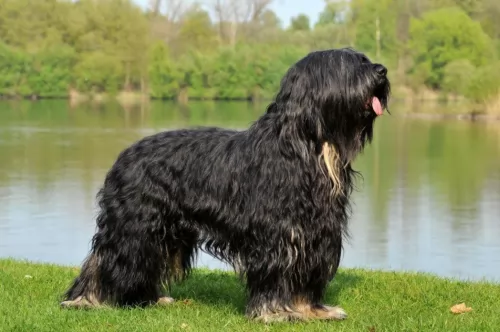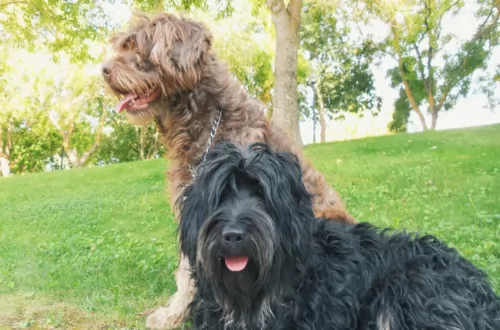 Petzlover
Petzlover Blue Lacy is originated from United States but Cao da Serra de Aires is originated from Portugal. Both Blue Lacy and Cao da Serra de Aires are having almost same height. Both Blue Lacy and Cao da Serra de Aires are having almost same weight. Both Blue Lacy and Cao da Serra de Aires has almost same life span. Both Blue Lacy and Cao da Serra de Aires has almost same litter size. Blue Lacy requires Low Maintenance. But Cao da Serra de Aires requires Moderate Maintenance
Blue Lacy is originated from United States but Cao da Serra de Aires is originated from Portugal. Both Blue Lacy and Cao da Serra de Aires are having almost same height. Both Blue Lacy and Cao da Serra de Aires are having almost same weight. Both Blue Lacy and Cao da Serra de Aires has almost same life span. Both Blue Lacy and Cao da Serra de Aires has almost same litter size. Blue Lacy requires Low Maintenance. But Cao da Serra de Aires requires Moderate Maintenance
 The Lacy brothers came to Texas in 1858, and this breed is named after them. They wanted a strong, robust working dog. It is a working/herding dog breed that originated in Texas in the mid 19th century.
The Lacy brothers came to Texas in 1858, and this breed is named after them. They wanted a strong, robust working dog. It is a working/herding dog breed that originated in Texas in the mid 19th century.
It is interesting to note that in June 2005, Governor Rick Perry brought about legislation adopting the Blue Lacy as the official Dog Breed of Texas. The breed is also registered by the National Lacy Dog Registry and the Animal Research Foundation.
Today the Blue Lacy is considered to be the perfect all-around dog, with the Lacy family history noting the breed to come from a mix of scent-hound, greyhound and coyote cross. There are theories around the scent hound used, with some believing it could have been an Italian Gray Hound, but whatever the case, the Lacy brothers established this breed under the guidelines required to develop a recognized breed.
 Ancestors of the Cao da Sera de Aires were used for herding livestock in the Serra de Aires and Alentejo, Portugal. This herding dog is native to Portugal and throughout the 20th Century he was kept as a working dog.
Ancestors of the Cao da Sera de Aires were used for herding livestock in the Serra de Aires and Alentejo, Portugal. This herding dog is native to Portugal and throughout the 20th Century he was kept as a working dog.
Known also as the Portuguese Sheepdog, Portuguese Shepherd Dog or Serra de Aires Mountain Dog, there are some questions surrounding the breed's ancestry as there are few records of dogs before 1900. The dog is thought to be related to the Pyrenean and Catalan Sheepdogs and that it has descended from Briards which were imported into Portugal and crossed with the Pyrenean Sheepdog.
The Cão da Serra de Aires breed standard was accepted by the Portuguese Kennel Club, and the breed was recognized internationally in 1996. The dog was also recognized by the United Kennel Club in the Herding Group in 2006.
 The medium-sized, well proportioned, muscular and lithe Blue Lacy stands at roughly 46–53cm. He has a coat which is smooth and short and in an attractive gun-metal gray color which can be classified as blue or almost black. Other shades are also available such as cream, yellow, reddish and you also get tri-colored Lacy’s.
The medium-sized, well proportioned, muscular and lithe Blue Lacy stands at roughly 46–53cm. He has a coat which is smooth and short and in an attractive gun-metal gray color which can be classified as blue or almost black. Other shades are also available such as cream, yellow, reddish and you also get tri-colored Lacy’s.
Pure Blue Lacy’s have some white markings on their brisket. Whatever color you have, these clean-looking dogs with their low maintenance coats are referred to as Blue Lacy’s. Their brown eyes are bright and alert, they have long tails and their ears hang down.
The American Blue Lacy gives one the sense of speed, agility and endurance. He is intelligent, active and alert, being an all-round dog who can adapt to being among ranchers and cowboys and then become gentle with children and his family.
With socialization, he is also tolerant of other dogs. Because he is so intelligent he can be quickly trained, and training and socialization will be recommended for him to ensure he is the perfect all-rounder he was designed to be. His alertness makes him an excellent watch dog.
 The beautiful Cão da Serra de Aires is a medium-sized dog. He stands at 45 to 55 cm at the withers and weighs about 17 to 27 kg. He is recognizable by the long, shaggy, single-layer coat, of straight or slightly wavy hair. Don’t be deceived by the coat as below, the dog has a muscular, athletic body.
The beautiful Cão da Serra de Aires is a medium-sized dog. He stands at 45 to 55 cm at the withers and weighs about 17 to 27 kg. He is recognizable by the long, shaggy, single-layer coat, of straight or slightly wavy hair. Don’t be deceived by the coat as below, the dog has a muscular, athletic body.
The coat comes in different shades such as fawn, gray, yellow and black. The dog has a long tail which is held straight out or down and he has medium-length, floppy ears. You’ve got to look hard, as the facial features of the dog are hidden by its shaggy coat. He has a lot of facial hair that sometimes you have to wonder if he can see out of his eyes.
The Cao da Serra de Aires is a wonderful canine companion and is devoted and loyal, forming strong bonds with their human family. He is a playful, amicable dog and gets on well with children in the home as well as with other pets.
He is intelligent and trainable, and when properly trained and socialized,he becomes an even nicer pet to have around and is obedient to his master’s voice. He is territorial, strong willed and dominant and makes a good watchdog too.
 Your Blue Lacy is such a low-maintenance, easy dog to have. Remember to have your puppy vaccinated from distemper, hepatitis, leptospirosis, parvovirus, and parainfluenza. These vaccinations start from 6 - 8 weeks of age. Also, because different areas have different regulations surrounding the rabies injection, check with your vet about this one.
Your Blue Lacy is such a low-maintenance, easy dog to have. Remember to have your puppy vaccinated from distemper, hepatitis, leptospirosis, parvovirus, and parainfluenza. These vaccinations start from 6 - 8 weeks of age. Also, because different areas have different regulations surrounding the rabies injection, check with your vet about this one.
A socialized, trained Blue Lacy makes such an awesome pet but you have responsibilities towards him. You need to know precisely what is required to keep him healthy and happy.
This is a versatile working dog who is intelligent and alert but also sensitive to being mistreated. Treat him decently and in exchange you’ll have a loyal, devoted canine family member.
 The Cão da Serra de Aires is such a loyal dog to his human family that he makes a splendid pet. He is active, having worked historically at herding and guarding.
The Cão da Serra de Aires is such a loyal dog to his human family that he makes a splendid pet. He is active, having worked historically at herding and guarding.
Socialization and obedience training ensure that he becomes an exceptional pet and he has a host of positive attributes to his name – he is intelligent, energetic, loyal and loving. He may have been used long ago to guard livestock, but today he is selected as a pet specifically for his excellent companionship and for his protective nature.
 The Blue Lacy is generally a healthy breed, but just like with any other dog breed they will be prone to some health conditions. Blue Lacys can also suffer with the likes of hip or elbow dysplasia and hypothyroidism.
The Blue Lacy is generally a healthy breed, but just like with any other dog breed they will be prone to some health conditions. Blue Lacys can also suffer with the likes of hip or elbow dysplasia and hypothyroidism.
This is a disease of the hip where the ball and socket joint is malformed. Hip dysplasia is when the hip joints don’t develop normally. It needs to be watched as it can result in loss of function of the hip joints. The disease can often begin when the dog is still very young.
Some breeds are genetically predisposed towards hypothyroidism, but environmental factors and certain medications can trigger autoimmune reactions. Not only that, a tight collar can also cause thyroid damage. The symptoms of hypothyroidism are weight gain, skin problems, dislike of the cold and even hair loss and then it’s time to get your pet thyroid-tested.
 As with most dogs that are looked after well, their health can be good. The Cao da Serra de Aires isn’t likely to keep you at the vet often. Just like with any good dog, there are some health disorders that can benefit you to know about.
As with most dogs that are looked after well, their health can be good. The Cao da Serra de Aires isn’t likely to keep you at the vet often. Just like with any good dog, there are some health disorders that can benefit you to know about.
Being forewarned , you can get your pet to the vet quickly before the illness gets out of hand.
There are some pet owners who want to have their pets tested by the Orthopedic Foundation for Animals as well as the Canine Eye Registration Foundation to rule out health defects such as hip dysplasia and cataracts before they manifest themselves in their pets. This is of particular importance to breeders so as to prevent the parent dogs passing bad genetic conditions to the puppies.
This is a common skeletal disease where the dog’s hip joints don’t develop properly. It can be terribly painful for your pet to get around. It’s a genetic condition and while it is more prevalent in big dogs, any breeds are susceptible.
Your dog will battle along with painful joints and sometimes his hind-end will be lame. You’ll notice that once lying down, he battles to get up again. Fortunately vets are well acquainted with this ailment and they have different options to treat and manage it.
Cataracts in your dog come about from a disease process which affects the lens of the eye. The eye loses its transparency and impairs vision. There are some instances where cataracts can cause blindness. You’ll see a whitish gray area in your pets eye. The most common cause of cataracts is genetics. Get your pet to the vet who will do certain tests to evaluate the eyes and make a recommendation.
 Typically of working breeds, the Blue Lacy is going to need a firm owner who provides guidance and leadership, and who is responsible with providing the Lacy with plenty of exercise. This dog was created for work, so they will be totally at home on a farm. If not, they will require long walks every day with lots of ball games too.
Typically of working breeds, the Blue Lacy is going to need a firm owner who provides guidance and leadership, and who is responsible with providing the Lacy with plenty of exercise. This dog was created for work, so they will be totally at home on a farm. If not, they will require long walks every day with lots of ball games too.
Care for the Blue Lacy doesn’t take much effort. He isn’t much of a shedder and therefore has low grooming requirements. He’ll require being brushed twice a week to get rid of loose hairs. If you start early with this grooming routine, he looks forward to this ‘bonding’ session.
Routine maintenance will require nail clipping and teeth cleaning as plaque can build up and leave your pet with dental problems and gum disease. Ask your veterinarian about dental care because there are special dog-designed toothpastes and brushes. Also check for ticks and fleas in and around the ears of your dog.
Your Blue Lacy is a high energy working dog so he will require a balanced diet to cater for his energy levels. He will certainly require some raw meat from time to time to avoid skin problems. Home prepared meals are also good and these can include rice, meat and vegetables.
Remember when in any kind of doubt, speak to your vet about dog food which meets the requirements of your dog, his age, his breed and his activity levels. Always have a bowl of clean, cool water available to him around the clock.
 As a working dog used to long hours of action, the Cao da Serra de Aires will need lots of activity. He’ll need you taking him for long walks and playing ball games with him. He can become frustrated and destructive when left without any physical stimulation.
As a working dog used to long hours of action, the Cao da Serra de Aires will need lots of activity. He’ll need you taking him for long walks and playing ball games with him. He can become frustrated and destructive when left without any physical stimulation.
The Cao da Serra de Aires may have long hair but he isn’t high maintenance. He won’t require professional grooming, but will require a good brush a least twice a week. This is because the long coat can tangle.
To keep him looking his best, you’ll want to be trimming the hair around his paws. Another important grooming task is checking his ears and cleaning them. You have to be careful about cleaning your pet ears if you don’t know how, as it could damage the ears. Your vet can always advise you on how this is done.